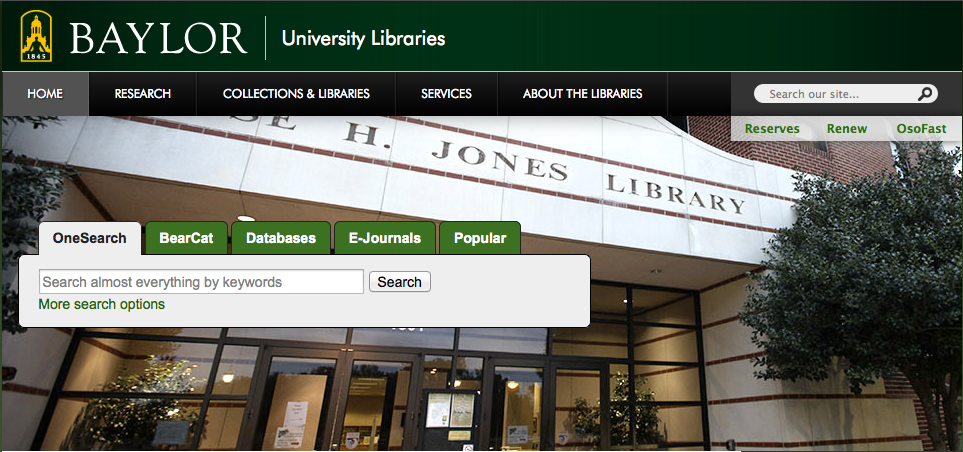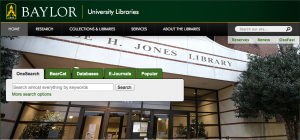

Reporter
OneSearch is all it takes to use the Baylor libraries’ new search engine. The search engine is part of the Baylor libraries’ new website.
The old search tool, BearCat, has been supplemented by a more modern system called OneSearch. OneSearch can go through hundreds of online databases, giving students access to a much wider range of materials, whereas BearCat was limited to materials only at Baylor.
“This really is a state-of-the-art system,” said Carl Flynn, director of communications for the Baylor University Libraries. “There’s less information up front; the layout is very clean.”
Flynn said he hopes the simplicity of the new system will encourage students to use OneSearch more than they did BearCat.
“You’re just going to be able to dig into more nooks and crannies that you couldn’t find before, or would have been difficult to find before,” he said. “It helps you get to the information you want for your research and some that you didn’t even know you wanted.”
OneSearch is similar to Google in that students can simply type in a word or phrase into the search bar and the results come up based on relevance. Another big improvement is the website’s ability to be used easily on tablets and smartphones.
Dallas freshman Jasmine Breaux said she likes the website and OneSearch system. “It’s very direct,” she said. “They’ve made it simple to find what you’re looking for on their page, and it’s nice to have so much material available to you when you’re doing research.”
Other students agreed and said the new system will help with essay writing.
“OneSearch is very easy to use,” said Paris, France, graduate student Margaux Halet. “Being able to choose what kind of material you want to look for makes it easier for writing papers, and it gives you so much information to choose from.”
However, students are usually more adaptable to new technology than their professors, Flynn said. Some people, especially faculty, had a hard time adjusting to the change, and the library has received some complaints.“Faculty get more frustrated than students,” Flynn said. “They get used to doing things a certain way. We’ve made the information easier to get to. They just don’t know that.”
The library had only used BearCat Plusfor a few years, and Flynn said it has no plans to radically change the system again.
“There’s a 2.0 version of OneSearch coming out that will have even more features, and when it gets here, we’ll update to that,” Flynn said. “But people aren’t developing anything beyond this kind of technology yet.”
BearCat is still found on the library website, and Flynn predicts it will be mostly used for students who are searching for a particular resource they know is available at the library. The library offers fall research seminars for students who are interested in learning about the new system.
The library technicians are still doing some background work on the system, cleaning up the site and indexing records, but it is ready to be used by students.
“It’s there as a service,” Flynn said. “We just try to make it as easy as possible, and if we don’t make it as easy as possible we want people to tell us so we can continue to innovate.”
EDITOR’S NOTE: This story has been modified to correct factual errors that ran in the original story. The headline was also changed to match the revised content.





